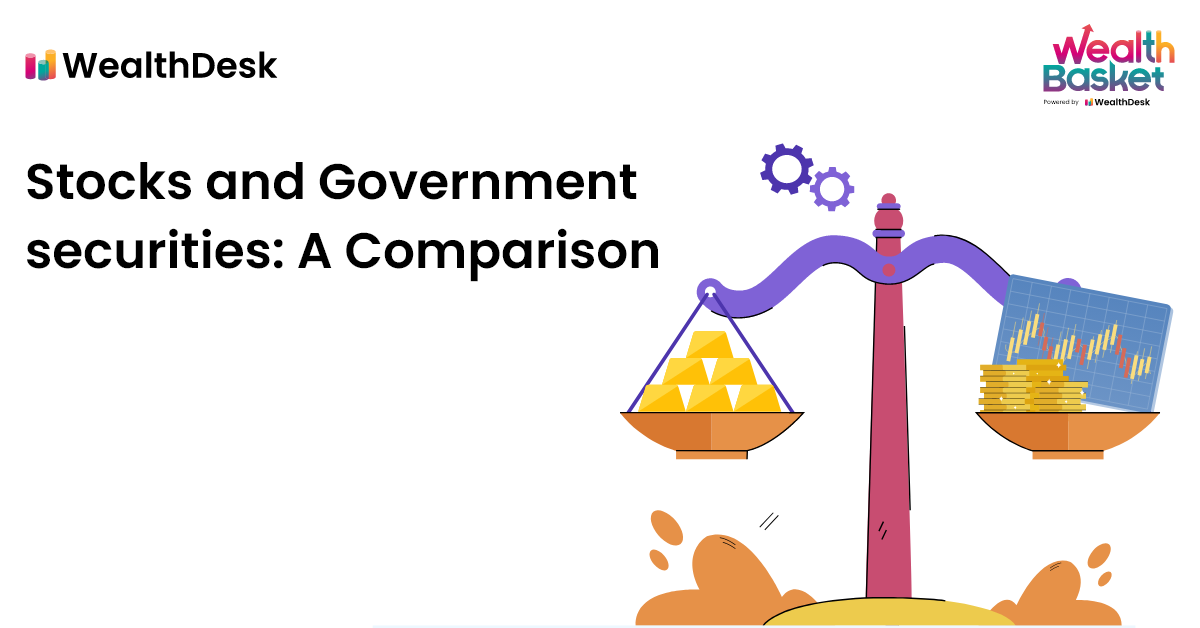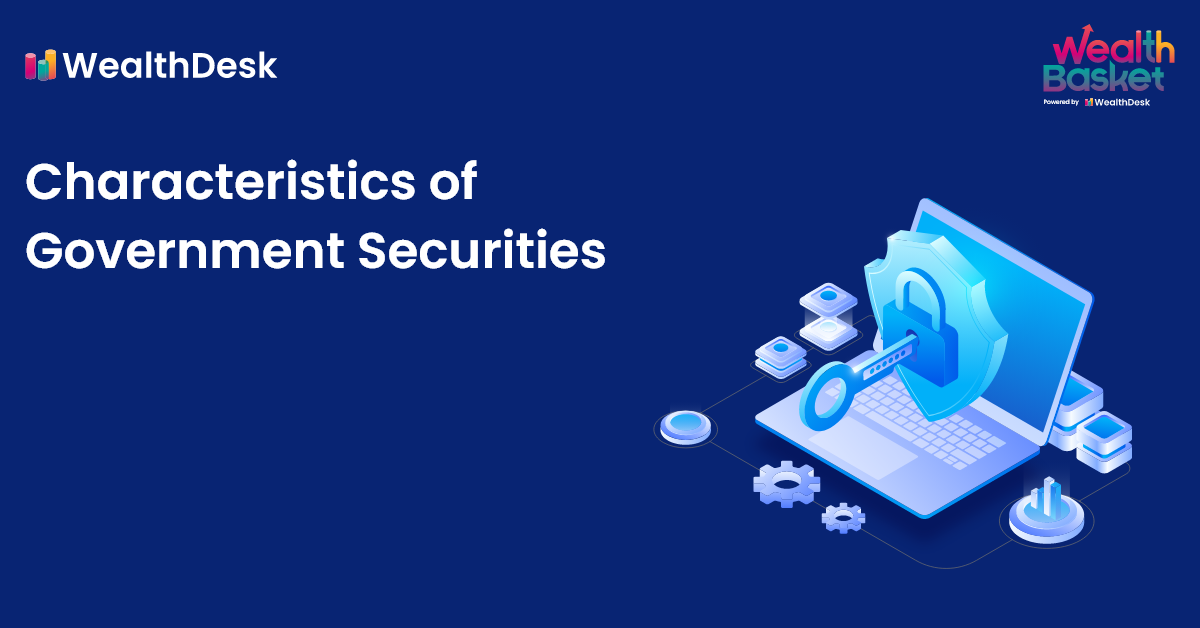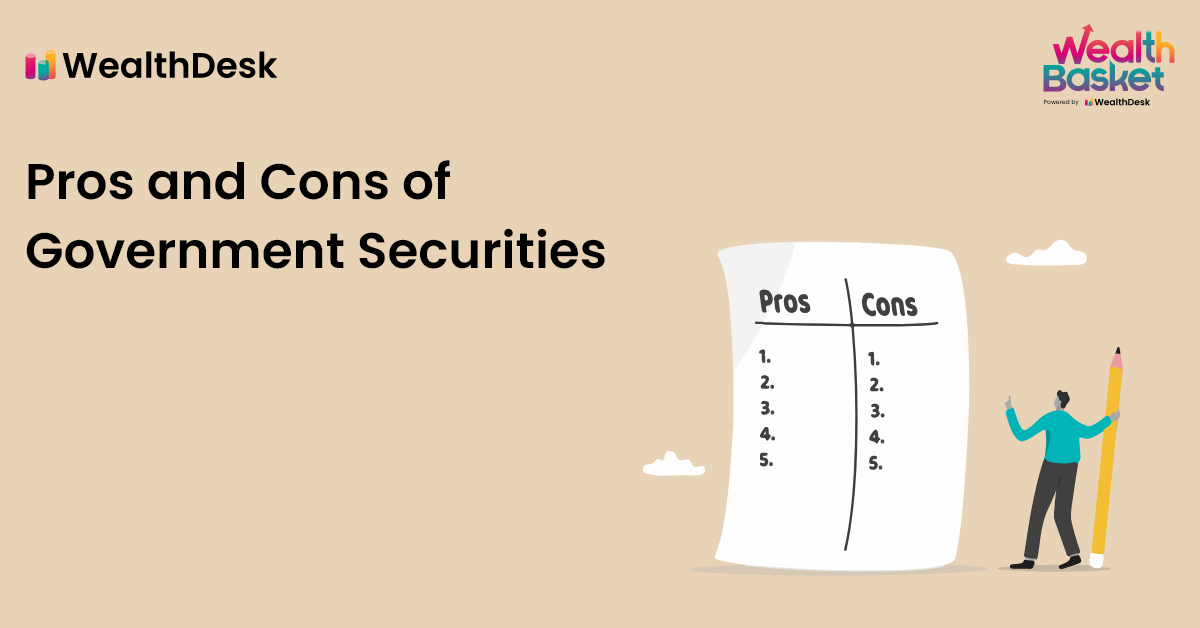Government securities have been hailed as risk-free fixed-income assets. Being a debt instrument that has never been defaulted has demonstrated the low credit risk. In addition, the interest payments make for a steady income.
Government security markets have changed a lot over the past few years. Traditionally, large institutional investors have been the main participants. However, due to the roll-out of the Retail Direct Scheme on 12th November 2021, retail investors too can trade in government securities.
In this article, we dig a little deeper into why Govt Securities are risk-free fixed-income assets, what their types are, and why investors might want to invest in them.
What is a Bond?
Government securities are also known as government bonds. When investors buy a bond, they are lending to an entity (the government or a company). A bond is a way to raise funds from the market for a fixed period at a variable or fixed interest rate. The investors who buy bonds are called debt holders or creditors of the issuer.
The following types of entities issue bonds:
- Municipalities
- State Governments
- Sovereign Governments
- Companies
Depending on the issuer, a bond can be categorised as private or public bonds. A private bond is issued by an entity of the private sector, i. e. a company. On the other hand, a public bond is issued by an entity of the public sector like Central and State Governments.
The interest payments on bonds are called coupons or coupon payments. They are paid periodically as specified from issue date to maturity. Coupons are expressed as a percentage of the face value. Bonds can be divided into coupon paying bonds and coupon-free bonds.
What is a G-Sec?
Government Securities (G-Sec) are bonds issued by the government for funding daily operations, infrastructure and military projects. They are tradeable instruments and are issued by the Central or State Governments.
Government Securities (G-Secs) can be divided into 2 categories depending on the period between issuing and repayment:
- Long-term G-Secs like Government Bonds or dated securities that can have a maturity of up to 40 years
- Short-term G-Secs like Treasury Bills with maturities lower than a year
Government Securities are issued by RBI auctions conducted on E-Kuber, an electronic platform. Unfortunately, Retail investors can not participate in these auctions, however, they can still buy or sell Government Securities by opening a Gilt Securities Account – ‘Retail Direct Gilt (RDG)’ with RBI.
What are the types of Government Securities available for retail investors?
Treasury Bills
Treasury bills, a.k.a T-bills, are short-term G-Secs with a maturity of less than 1 year. The Indian Government issues T-bills of the following maturities:
- 91 Days
- 182 Days
- 364 Days
Treasury bills do not pay interest and thus are called zero-coupon bonds. Instead, they are issued at a discount and redeemed at face value on the date of maturity.
For example, a 182 Day T-bill with a face value of ₹100. This T-bill may be issued for a value of ₹90.
Dated G-Secs
Dated G-Secs can have either fixed or floating coupon rates. They are long-term debt instruments with a wide range of maturity ranging from 5 to 40 years. The Government of India issues 9 types of dated G-Secs:
- Floating Rate Bonds
- Fixed-Rate Bonds
- Inflation-Indexed Bonds
- Capital Indexed Bonds
- Sovereign Gold Bonds
- 75% Savings (Taxable) Bonds, 2018
- Bonds with Call/Put Options
- STRIPs (Separate Trading of Registered Interest and Principal of Securities)
- Special Securities
State Development Loans (SDLs)
State Development Loans are G-Secs issued by the State governments for meeting their budgetary requirements. SDLs pay coupons on a half-yearly basis and repay the principal amount on maturity. They are generally issued for periods up to 10 years. They pay fixed coupon payments during their tenure.
Sovereign Gold Bonds
Sovereign Gold Bonds or SGBs are issued by RBI on the behalf of the Indian Government. As the name implies, they are indirect investments in gold. Every gram of gold in this bond has 999 purity. RBI ensures that investors will never lose in terms of the quantity of gold that was allotted to them through SGBs. However, if the price of gold declined the investor would suffer losses.
Note: The returns on gold have been negative for only one of the last 6 years (Jan-2016 to Dec-2021, returns are calculated calendar year basis).
Sovereign Gold Bonds are a better alternative to direct investment in physical gold as they have given you the advantages of:
- No holding cost or storage cost
- Fixed interest rates
- Allow investors to get a lower price when applied online
In addition, the capital gains on the maturity of these bonds are entirely tax-exempt.
Why should you invest in G-Secs?
No credit risk
G-Secs have practically no risk of default. There are no records of the government of India defaulting on domestic bond payments. While they carry an interest-rate risk, they do not lose money if held until maturity. Thus, G-Secs are called risk-free gilt-edged instruments. The guarantee on these bonds is given by the Indian government and is known as the ‘Sovereign Guarantee’.
Diverse market
G-Secs cater to the various needs of investors through the different types of bonds available in the market. There are alternatives available for investors wanting fixed returns or to protect their savings against inflations. Investors can also get exposure to gold-backed bonds issued by RBI.
Long-term investment options
G-Secs are risk-free alternatives for anyone looking for stable returns in the long term. They are often stated to be a better alternative to fixed deposits for the following reasons:
- More liquidity: Pulling out of G-Secs is easier than pulling out of a fixed deposit as there is a free market for the former.
- Sovereign Guarantee
- Option to invest with longer maturity
Give back to the nation
Investing in government securities gives investors the opportunity to invest in the growth of our nation. The money used is for funding projects like schools, hospitals, roads, bridges, educational and research institutions.
The Takeaway
There is a very diverse market for government securities. Ranging from inflation-indexed bonds to sovereign gold bonds, they are a great tool for diversifying a portfolio against risk. As a long-term investment alternative, they may give better benefits than fixed deposits. At the same time, they have no credit risk and investors don’t lose money if they hold them till maturity.
WealthDesk is a platform where one can invest in portfolios made by SEBI registered WealthBasket managers. The portfolios known as WealthBaskets consist of equity stocks and ETFs that are transferred to your Demat account. You can find a WealthBasket for every kind of investing idea ranging from portfolios aimed at stability, high returns, momentum investing or even portfolios aimed at taking advantage of initiatives like Digital India or Make In India.
FAQs
Government securities have practically no credit risk. In India, there are no records of default on government bonds. They are a good option for stable long-term income. They also have a diverse market providing investors with the opportunity to protect against inflation, credit risk or even pin their investments to the returns of gold.
Bonds provide investors with stable fixed income for
the period until maturity. They are also a good way
to preserve the capital until maturity. One can
choose between safe G-Secs and high return private
bonds as well.
Government securities are
a viable tool used for retirement planning because
of the stable returns and no risk of default. One
can also protect their retirement fund against
inflation by investing in Inflation-Indexed bonds.
Investing in bonds can expose you to the following
risks:
Price Risk: This refers
to the risk of losing capital. One can avoid this
risk by holding until maturity.
Credit Risk:
This refers to the risk of default by the debtor
which would be the company or government issuing the
bond. This risk can be avoided by investing in
G-Secs which carry no risks.


















